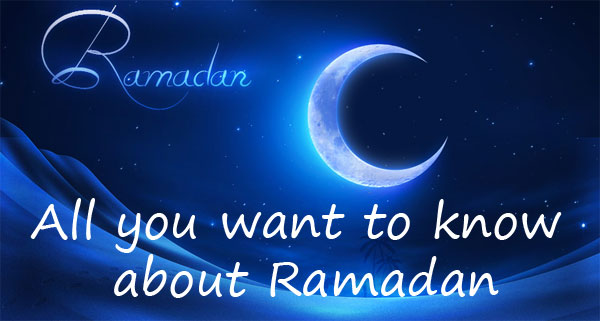We bring you the must know Facts about Ramadan / Ramazan
1) What Is Ramadan?
Ramadan is the ninth month of the Islamic calendar. Every day of this month, Muslims fast on the day from sun rise to sun set. In the night Muslims gather together to offer Namaz or Prayers in Masjid . These night prayers are called Taraveeh. In the Holy Quran its revealed about Ramadan that:
“Ramadan is the month in which was sent down the Qur'an as a guide to humanity and as a clear sign for guidance and judgment (between right and wrong). So anyone of you who witnesses the month should spend it in fasting...” (Al-Qur'an, 2:185)
The statement which tells the importance of this month is:
“So anyone of you who witnesses the month should spend it in fasting.”
Read about Ramadan Dua
2) Fasting is to make intention (Niyat) to fast from the break of dawn to sunset for the sake of Allah and to refrain from eating, drinking or having sexual intercourse.
3) Fasting for the whole month of Ramadan is obligatory (Farz) for all muslims who have reached puberty. Its advised that, Children must also be told to keep fast, so that they are taught from earlier age. Without any genuine reason, not
keeping fast is a Sin.
4) Fasting is also called Sawm
Fasting is one of the Five Pillars of Islam, which is the basis of Iman for the muslims. It is at number 3 position in the pillars list
The Five Pilars of Islam are:
1) Shahadat (Faith)
2) Prayer (Namaz)
3) Roza (Fasting)
4) Zakat (Charity)
5) Hajj
5) The Messenger of Allah (Peace be upon him) has said, “When Ramadan begins, the doors of heaven are opened.”
6) The main purpose of fast being made obligatory on a Muslim is not that one stays hungry and thirsty; but in fact the main purpose is to break the desire for lust, and to cool the fire of selfishness, so that the soul instead of being inclined towards the desires of lust, it becomes obedient towards the commands of The Almighty
7) Qaza is a must for a muslim, if he or she has not kept fasting for the day due to any valid reasons.
8) Fasting is not only to stay away from food, its also the fast of how a Muslim behaves and shows his characteristics. Offensive acts during Fasting are
a) Backbiting, slander
b) To lie or deceive
c) To use abusive language
d) Not having iftar
e) Taste a food without swallowing it, using toothpaste.
f) Gargling water due to thirsts or hot weather.
g) Wrapping oneself with wet clothes.
h) Throwing up intentionally
i) Weakening the body (e.g. strenuous sport)
j) Gathering saliva and swallowing it;
Read Do's and Dont's of Fasting
9) If a woman menstruates, she stops fasting and makes up [fasting for the days of menstruation].
10) Someone who lost consciousness in Ramadan does not make up the day on which the loss of consciousness occurred, but he makes up that which came after it.
11) If a traveler arrives, or a [menstruating] woman attains purity with part of the day [remaining], they abstain [from those things which invalidate fasting] for the rest of that day.
Kaffara (Penalty) for not fasting
12) Muslim must eat before the day breaks (Sehri) even when one is not hungry.
13) Wet dream, swallowing ones own saliva when still in the mouth, brushing teeth, smearing oil, ointment on unwounded body do not break fast. or used antimony [in his eyes].
14) In this month, many Muslims five chaity to the needy. It is called Zakat with is also a pillar of Islam.
Zakat is Farz and those who reject it as Farz are infidels and those who do not give Zakat are wrongdoers and worthy of execution and those who delay and do not give Zakat on time are sinners and their testimony or oath will not be accepted [Alamgiri,Bahar]. According to Shariat, Zakat is defined as from your goods to take one part for Allah which has been fixed by Shariat and to make a Muslim poor person the owner of it.
15) On completion of 1 Month of Fasting, Muslims celebrate the next as Eid. This is called Eid-ul-Fitr.
Eid is a day of celebration for Muslims, a day of happiness. On this day, Muslims perform two rakaats of prayer, meet one another, shake hands and embrace and give charity to the poor and needy. Islam teaches protecting the poor, helping the helpless, and easing the pain and sufferings of orphans and the meek at every turn, and they should not be forgotten, especially on the day of Eid. That is why Rasoolullah (Sallallahu Alaihi Wasallam) ordered us to pay the Sadqa-e-Fitr before performing the Eid Salaah so that Muslims remember their poor brothers on this occasion and include them in their happiness.
16) The last 10 days of Ramadan has a special importance for Muslims. These days contains the Laylat Al Qadr or “Night of Power”. In this night the Holy Quran was revealed. On this night, Muslim stay awake the whole night in prayers.
1) What Is Ramadan?
Ramadan is the ninth month of the Islamic calendar. Every day of this month, Muslims fast on the day from sun rise to sun set. In the night Muslims gather together to offer Namaz or Prayers in Masjid . These night prayers are called Taraveeh. In the Holy Quran its revealed about Ramadan that:
“Ramadan is the month in which was sent down the Qur'an as a guide to humanity and as a clear sign for guidance and judgment (between right and wrong). So anyone of you who witnesses the month should spend it in fasting...” (Al-Qur'an, 2:185)
The statement which tells the importance of this month is:
“So anyone of you who witnesses the month should spend it in fasting.”
Read about Ramadan Dua
2) Fasting is to make intention (Niyat) to fast from the break of dawn to sunset for the sake of Allah and to refrain from eating, drinking or having sexual intercourse.
3) Fasting for the whole month of Ramadan is obligatory (Farz) for all muslims who have reached puberty. Its advised that, Children must also be told to keep fast, so that they are taught from earlier age. Without any genuine reason, not
keeping fast is a Sin.
4) Fasting is also called Sawm
Fasting is one of the Five Pillars of Islam, which is the basis of Iman for the muslims. It is at number 3 position in the pillars list
The Five Pilars of Islam are:
1) Shahadat (Faith)
2) Prayer (Namaz)
3) Roza (Fasting)
4) Zakat (Charity)
5) Hajj
5) The Messenger of Allah (Peace be upon him) has said, “When Ramadan begins, the doors of heaven are opened.”
6) The main purpose of fast being made obligatory on a Muslim is not that one stays hungry and thirsty; but in fact the main purpose is to break the desire for lust, and to cool the fire of selfishness, so that the soul instead of being inclined towards the desires of lust, it becomes obedient towards the commands of The Almighty
7) Qaza is a must for a muslim, if he or she has not kept fasting for the day due to any valid reasons.
8) Fasting is not only to stay away from food, its also the fast of how a Muslim behaves and shows his characteristics. Offensive acts during Fasting are
a) Backbiting, slander
b) To lie or deceive
c) To use abusive language
d) Not having iftar
e) Taste a food without swallowing it, using toothpaste.
f) Gargling water due to thirsts or hot weather.
g) Wrapping oneself with wet clothes.
h) Throwing up intentionally
i) Weakening the body (e.g. strenuous sport)
j) Gathering saliva and swallowing it;
Read Do's and Dont's of Fasting
9) If a woman menstruates, she stops fasting and makes up [fasting for the days of menstruation].
10) Someone who lost consciousness in Ramadan does not make up the day on which the loss of consciousness occurred, but he makes up that which came after it.
11) If a traveler arrives, or a [menstruating] woman attains purity with part of the day [remaining], they abstain [from those things which invalidate fasting] for the rest of that day.
Kaffara (Penalty) for not fasting
12) Muslim must eat before the day breaks (Sehri) even when one is not hungry.
13) Wet dream, swallowing ones own saliva when still in the mouth, brushing teeth, smearing oil, ointment on unwounded body do not break fast. or used antimony [in his eyes].
14) In this month, many Muslims five chaity to the needy. It is called Zakat with is also a pillar of Islam.
Zakat is Farz and those who reject it as Farz are infidels and those who do not give Zakat are wrongdoers and worthy of execution and those who delay and do not give Zakat on time are sinners and their testimony or oath will not be accepted [Alamgiri,Bahar]. According to Shariat, Zakat is defined as from your goods to take one part for Allah which has been fixed by Shariat and to make a Muslim poor person the owner of it.
15) On completion of 1 Month of Fasting, Muslims celebrate the next as Eid. This is called Eid-ul-Fitr.
Eid is a day of celebration for Muslims, a day of happiness. On this day, Muslims perform two rakaats of prayer, meet one another, shake hands and embrace and give charity to the poor and needy. Islam teaches protecting the poor, helping the helpless, and easing the pain and sufferings of orphans and the meek at every turn, and they should not be forgotten, especially on the day of Eid. That is why Rasoolullah (Sallallahu Alaihi Wasallam) ordered us to pay the Sadqa-e-Fitr before performing the Eid Salaah so that Muslims remember their poor brothers on this occasion and include them in their happiness.
16) The last 10 days of Ramadan has a special importance for Muslims. These days contains the Laylat Al Qadr or “Night of Power”. In this night the Holy Quran was revealed. On this night, Muslim stay awake the whole night in prayers.
















No comments